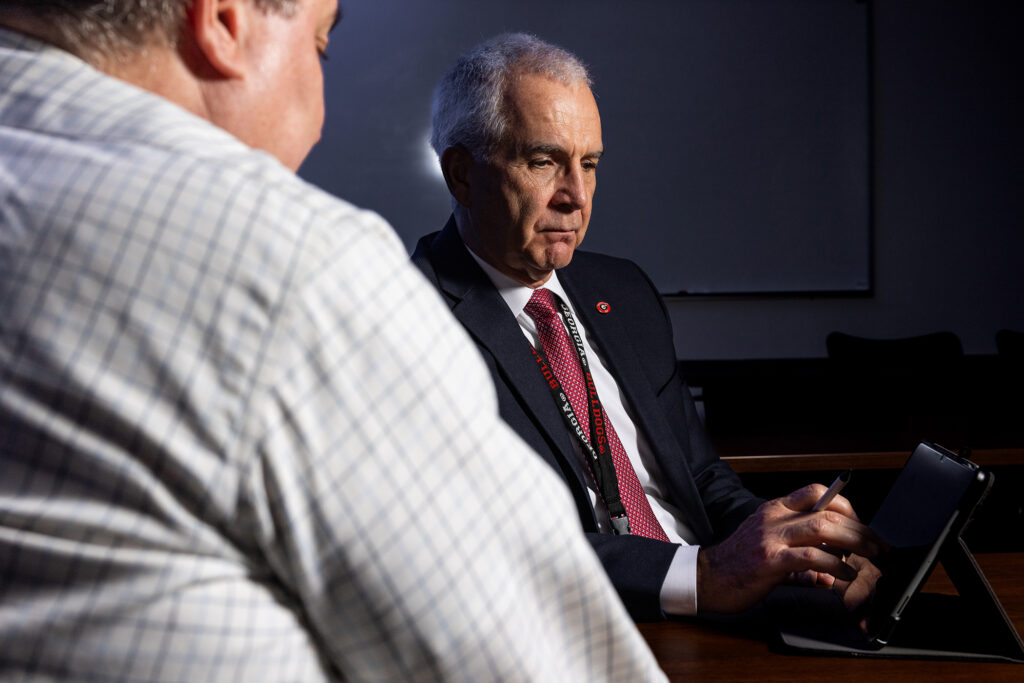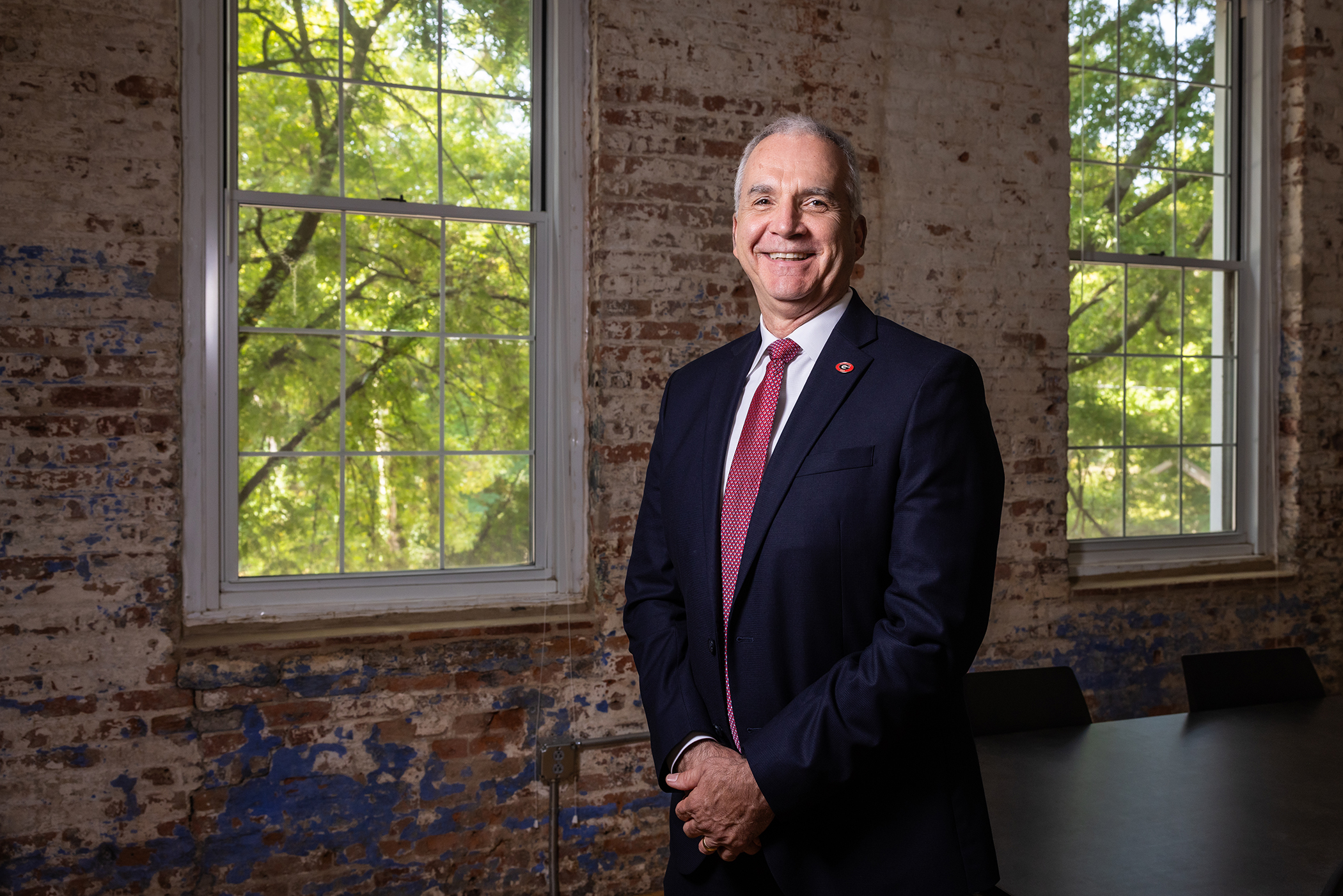Mark Lupo never envisioned a career that involved cybersecurity or working with college students. What he learned a long time ago, however, was that he wanted to help people.
From his time as a medic in the U.S. Army Special Forces to working in home health care to his public service and outreach roles at the University of Georgia, Lupo’s work has focused on serving others.
“I’ve always enjoyed being able to help others,” said Lupo, a senior public service associate at the UGA Institute of Government.
As the program coordinator for the UGA CyberArch program, Lupo assists UGA in strengthening cybersecurity across the state while educating and empowering students to form the adaptable workforce of tomorrow.
He has overseen the growth in the CyberArch program from eight unpaid student interns to 36 paid interns and two graduate research assistants in less than three years. More than 100 students are on a waiting list to join the program.
Housed at the Institute of Government, a unit of UGA Public Service and Outreach, the CyberArch program also helps students gain a deeper understanding of UGA’s service mission to the state while helping communities address cybersecurity challenges.
“What’s so rewarding about this role with CyberArch is building an environment that is helping these interns get their footing and watching them quickly engage with the concepts of cybersecurity and develop creative solutions for the issues they encounter,” said Lupo, who also serves on the UGA Leadership Council on AI. “But more than that, we’re seeing their work provide impact out in the state. It’s a privilege to be a part of that.”
Lupo, a native of Phenix City, Alabama, first connected with UGA as a business owner. Lupo was working as an administrator in home health care, while his wife was in family counseling, and they had talked about opening a coffee shop or a bookstore. On a trip to Gatlinburg, Tennessee, they visited an art gallery and quickly realized they had found their business venture.
“It was kind of the embodiment of what we were visualizing,” Lupo said.
With the help of the UGA Small Business Development Center, the Lupos secured a loan from the Small Business Administration and opened an art gallery in Columbus. The success of the gallery and the relationship they had built with the SBDC led to a second gallery opening in Warm Springs.
Those days as a business owner gave Lupo a new perspective on service work and building lasting and impactful relationships. When he was approached about joining the SBDC as a business consultant, he didn’t hesitate. Working at UGA was his chance to once again give back.
“As an SBDC consultant, you’re providing a service to people, and having been there and been in some of those really frightening places as a business owner, it was so reassuring to have a partner like UGA there when I needed them,” said Lupo. “Through the partnerships with clients, I was able to give that reassurance back.”
Lupo joined the SBDC office in Columbus as a business consultant in 2005 and became the area director in 2012. In 2018, he became the business education and resilience specialist at the SBDC state office, where he developed a national reputation as an expert in business continuity and emergency preparedness — areas that carved a pathway to his current role with CyberArch.
Lupo’s transition from a business consultant to an agent of cybersecurity started in 2016 when the U.S. Department of Defense began to require higher levels of cybersecurity from its vendors and business partners. Lupo said this shift began to change how businesses saw themselves in the cybersecurity world. Instead of waiting for a cyberattack, businesses began to approach cybersecurity more proactively. As a result, the SBDC started to focus on cybersecurity for small businesses and Lupo’s expertise in planning for emergencies made him the right candidate to lead the way.
Once again, Lupo was helping others.
“I saw that as an opportunity. In my experience, when you start talking about emergency preparedness, cybersecurity is not a high priority for small businesses because they’re so focused on just operating the business, unless it happens and then the response can come after the fact,” said Lupo.

Lupo’s cybersecurity work with small businesses eventually led him to CyberArch, which started in fall 2017 as a pilot program within the Office of the Vice President for Public Service and Outreach. The program brought together academic and public service faculty to develop a plan on how best to approach community cybersecurity outreach.
After the pandemic, CyberArch leaders started looking for ways to get students involved. In Spring 2022, CyberArch ran a pilot program with eight unpaid interns. Lupo, who calls his UGA career “a collection of supporting individuals,” made an easy transition into the program coordinator role in July 2022.
His impact on the program has been immense, attracting financial support from Google, which led to expansion of both the number of student interns and the number of partners served.
Now, Lupo is helping ensure that students leave with a deeper understanding of UGA’s commitment to serve the people of Georgia and the job skills to do so.
“Our mission within CyberArch is to strengthen the cyber infrastructure throughout Georgia. We’re able to provide a service directly to organizations and communities throughout the state that can benefit from this,” said Lupo. “That’s what being in public service is all about.”


